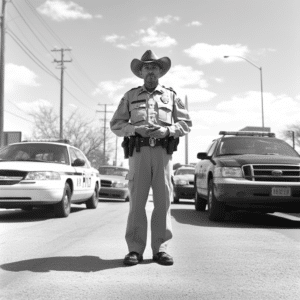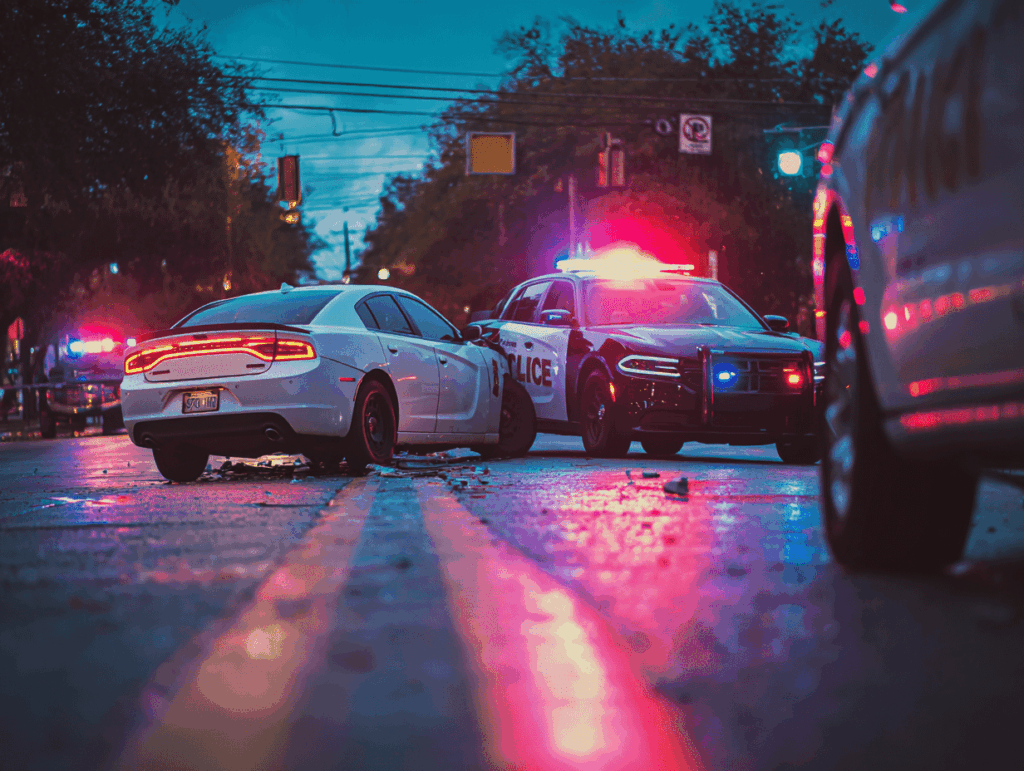Key Takeaways
- Immediately ensure safety at the scene, report the accident, and exchange information with the involved police officer.
- Understand your rights to seek compensation and the legal obligations to provide truthful information in police reports.
- Determine fault by ensuring thorough evidence collection and be aware of police immunity and liability when filing claims.
Let's Go Beyond, to Bring You Back
Let's get you the compensation you're entitled to. Get a FREE Consultation today.
Let's Go Beyond, to Bring You Back
You deserve the compensation you’re entitled to, call for your FREE Case Review today.
Immediate Steps After the Accident
When you find yourself in a car accident involving a police officer, your immediate actions are crucial. The first steps include ensuring everyone’s safety, reporting the accident, and exchanging information.
Ensure Safety First
Your first priority is safety. Move away from traffic to a safe location, turn on your hazard lights, and set up warning signals to alert other drivers. Check yourself and any passengers for injuries immediately after the accident happened. For more information, consider reading car accidents blog posts.
Taking steps to ensure safety protects both you and others.
Report the Accident
You must report the accident to the police. Inform the police about any injuries upon their arrival at the scene. If there are injuries or property damage exceeding $1,000, you must report the incident within 24 hours.
It’s necessary to call the police right after an accident, even if no one is injured.
Exchange Information
Gathering information from all parties involved is necessary. Collect contact details, badge number, insurance information, and vehicle license plate from the police officer involved. This data is important for insurance claims and determining liability.
Understanding Your Rights and Responsibilities
Knowing your rights and responsibilities is key when dealing with an accident involving a police officer. This encompasses understanding your right to compensation and your legal duties.
Right to Compensation
You are entitled to seek compensation if the police officer is at fault. Being struck by a police car may make you eligible for compensation. This could come from the city or county. However, your options for compensation may be limited if the police car was responding to an emergency. .
Legal Obligations
It is your legal duty to provide accurate and truthful information in police reports. If you dispute information in a police report, you need documentation to support your claim of error. Before making a statement, consider talking to a car accident lawyer. A lawyer can help you navigate legal complexities and ensure your interests are protected.
Auto Accident Lawyers
Get Compensated For Your Injuries & Damages! Call Us For A FREE Case Review And Know What Your Case Is Worth.
Determining Fault in Accidents Involving Police Officers
Determining fault requires understanding the investigating officer’s role, evidence collection, and police immunity and liability.
Investigating Officer’s Role

Evidence Collection
Gathering evidence, such as photographs and witness statements, is necessary to support claims. Detailed photographs and witness statements can provide crucial evidence and help establish liability.
Details in the police car accident report can be essential for your claim.
Police Immunity and Liability
Compensation claims against police officers can be complicated due to legal protections like sovereign and qualified immunity. Officers may be held accountable for negligence or reckless behavior while on duty.
Proving negligence can be challenging, but it is not impossible.
Filing an Insurance Claim After a Police Car Accident
Filing an insurance claim after an accident with a police officer involves several steps, including contacting your insurance company, navigating the claims process, and seeking legal assistance.
Contacting Your Insurance Company
Inform your insurance company right away to facilitate the claims process. Provide all relevant details about the accident.
Medical expenses related to injuries from an accident with a police officer can be covered under personal injury claims.
Navigating the Claims Process
Police departments may be reluctant to acknowledge mistakes. This can make the insurance claim process more complicated. Sending a copy of the police report to the insurance company can expedite the process.
If insurance negotiations fail, you may need to pursue a personal injury lawsuit.
Seeking Legal Assistance
An attorney can help navigate the complexities of claims after an accident involving a police officer. You might consider filing a lawsuit against the police officer or department if negotiations fail.
Gathering evidence and securing expert testimonies are key steps in preparing for court.
Damages and Compensation
Potential damages and compensation after an accident with a police vehicle can include medical expenses, lost wages, impairment, and pain and suffering.
Medical Expenses
Medical expenses can include hospital bills, surgery costs, rehabilitation, and ongoing treatment. Keeping a detailed record of medical expenses is necessary to support your claim.
Lost Wages and Non-economic Damages
Lost wages refer to the income that a person cannot earn due to injuries sustained in an accident. Compensation for non-economic damages includes physical pain, mental anguish, and physical impairment/loss of enjoyment of life. The severity of injuries and the impact on daily life influence the assessment of these damages.
Legal Options and Next Steps
Legal options and next steps after an accident with a police officer involve consulting an attorney, filing a lawsuit, and preparing for court.
Consulting an Attorney
An attorney can greatly assist with complex claims involving police officers. Attorneys can assist with complicated accident claims and navigating bureaucracy.
Filing a Lawsuit
If hit by a police car, you can sue the officer, department, or other liable parties. Consider your next steps if insurance negotiations are unsatisfactory. Taking your case to court could be an option to consider.
Preparing for Court
Knowing your legal options is key if negotiations with the police department fail. A law firm can offer vital advice and representation throughout your legal process.
Frequently Asked Questions
What should I do immediately after an accident with a police officer?
Immediately ensure safety, report the accident to the police, and exchange information with the officer involved.
Can I seek compensation if the police officer is at fault?
You are entitled to seek compensation if a police officer is at fault, though specific limitations may be imposed.
How is fault determined in an accident involving a police officer?
Fault in an accident involving a police officer is typically assessed through the police report, corroborating evidence, and the documentation provided by the investigating officer. Thus, careful consideration of these elements is essential in establishing liability.
What types of damages can I claim after an accident with a police vehicle?
You can claim medical expenses, lost wages, and pain and suffering after an accident with a police vehicle. It’s important to document all related costs to support your claim effectively.
Should I consult an attorney after an accident with a police officer?
Yes, consulting an attorney is advisable to navigate the complexities of the situation and protect your rights effectively.


